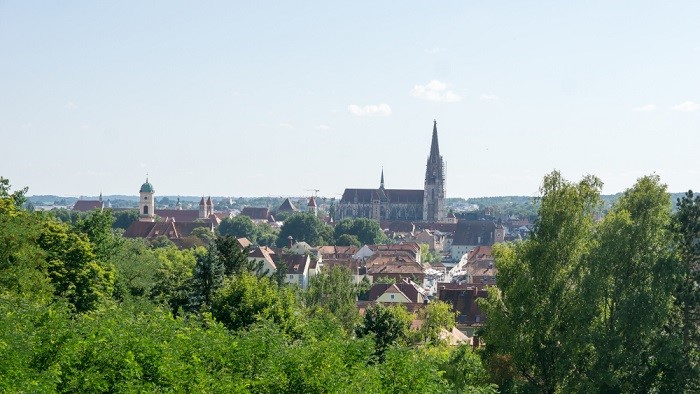Quantum computing - The full spectrum
In late summer, the summer school was one of the highlights of the Elite Graduate Program "Physics Advanced with integrated graduate program". Because of the Corona pandemic, this year it was not held in Tramin in South Tyrol as usual, but in Regensburg. The topic the students had agreed on was quantum computing. The main part of the week consisted of lectures by three experts on this topic who had been invited and visited us during the week in Regensburg. The first speaker was Prof. Dr. Rudolf Gross from the TU Munich. He introduced the theoretical concepts and gave an overview of the basic ideas. The second invited speaker was Prof. Dr. Frank Wilhelm-Mauch from the University of Saarbrücken and the FZ Jülich. In his lectures, he introduced us to quantum algorithms and quantum gates and later showed where various errors can arise in quantum computers and what strategies are available to correct them. As the third speaker, Prof. Dr. Ferdinand Kuemmeth from the Niels Bohr Institute in Copenhagen spent the week with us. He mainly went into the experimental perspective of quantum computers.
Challenging tasks for the participants
In order to be able to apply in practice what we have learned in the lectures, the experts set various tasks on Tuesday and Wednesday afternoon. These ranged from theoretical basics to the step-by-step experimental construction of a quantum computer (on paper) to programming code, which was even executed on a real quantum computer at IBM in the end. The groups here were made up of students from different years, so that each person could contribute their own knowledge and networking between the years was encouraged. Thanks to the good weather, most of the tasks could be solved outdoors on the beautiful university campus at Regensburg. The results of the group work were then presented to the other groups in a plenary session on the last day.
But the social aspect was not neglected either. To add a little Italian flair, we had lunch at the University of Regensburg's pizzeria. This was a good opportunity to talk to the lecturers and discuss further questions about their lectures and research topics. The evenings were mostly free, so the participants of the study week explored summery Regensburg by night and spent many hours on the banks of the Danube.
Regensburg from a new perspective
On Thursday, there were two city tours of several hours with exciting topics to choose from. These took us deep into Regensburg's history and we learned how today's cityscape came about. The Regensburg students were also able to learn a lot of new things about their university city. Afterwards, a hike was on the agenda, and the late summer gave us fantastic weather for it. We went north over the famous Steinerne Brücke to the Winzerer Höhen and then west along the Danube, where we were rewarded with a beautiful view of Regensburg's old town, which, by the way, has been a UNESCO World Heritage Site since 2006 together with Stadtamhof (the part north of the Steinerne Brücke). The evening was rounded off with a visit to a beer garden directly on the Danube, where we were able to sample a wide variety of Bavarian delicacies.
Text: Martin Majewski, Max Joseph Fahn, Elite Graduate Program "Physics Advanced with integrated graduate program"


